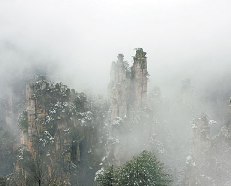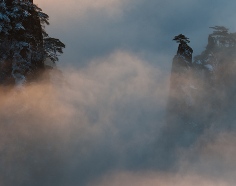 Listen to Shirley Singing the Poem in Chinese Dec 19, 2013
Listen to Shirley Singing the Poem in Chinese Dec 19, 2013 Listen to Shirley Singing the Poem in English Dec 21, 2013
Listen to Shirley Singing the Poem in English Dec 21, 2013 Listen to Shirley Singing the Poem in Chinese & in English Dec 22, 2013
Listen to Shirley Singing the Poem in Chinese & in English Dec 22, 2013 Listen to Shirley Singing the Poem in English & in Chinese Dec 22, 2013
Listen to Shirley Singing the Poem in English & in Chinese Dec 22, 2013 Listen to Shirley Explaining the Poem
Listen to Shirley Explaining the Poem  Follow Shirley to Read the Poem & New Words
Follow Shirley to Read the Poem & New Words  Learn the Meaning of the Poem with Shirley Together
Learn the Meaning of the Poem with Shirley Together See Shirley's Painting for the Poem Dec 22, 2013
See Shirley's Painting for the Poem Dec 22, 2013 
Hello, friends, today, I would like to introduce a new Chinese classical poem Yu Ye Ji Bei - Send to My Wife / Friend in the Northern Hometown in a Rainy Night by Tang Dynasty(618-907) poet Li Shangyin (813-858).
About the Poet – Li Shangyin (813-858)Li Shangyin(813-858) was one of the greatest poets in the later period of the Tang Dynasty.
He was a successful candidate in the highest imperial examinations when he was 25 years old. He fell over oneself for polity and some innovation and just in the cruel political struggle, he was excluded and his political dream could not be true until he was dead when he was only 45 years old with a poor life, chill and depressed heart...
Just for the sad life experience, made Li Shangyin become a famous representative poets in the later period of Tang Dynasty. He had a same reputation as Du Mu and be called "Little Li Du" (The big “Li Du” is Li Bai and Du Fu) But he had more and bigger effect to the poets and poetry create to the following Chinese poetry history. Now there are more than 600 poems by him in the world. The highest accomplishment of his is Lǜ Shi -- a poem of eight lines, each containing five or seven characters, with a strict tonal pattern and rhyme scheme.
Original Poem, Lyrics of the Song in Chinese and PronunciationsYou can click on any Chinese Character to open the New Character Board and see its Chinese pinyin, meaning, pronunciation and follow my reading, you can also click on the links to enter the Painting Column, to see more paintings and art notes that I wrote for the poem.
夜雨寄北唐 - táng (618-907)
李商隐 - lǐShāngyǐn (813-858)
君问归期未有期-- Jūn wèn guīqīwèi yǒu qī,
巴山夜雨涨秋池-- Bāshān yèyǔzhàng qīu chí。
何当共剪西窗烛-- Hé dāng gòng jiǎn xī chuāng chú,
却话巴山夜雨时-- Quèhuà Bāshān yèyǔshí。
君问归期未有期-- Jūn wèn guīqīwèi yǒu qī,
巴山夜雨涨秋池-- Bāshān yèyǔzhàng qīu chí。
何当共剪西窗烛-- Hé dāng gòng jiǎn xī chuāng chú,
却话巴山夜雨时-- Quèhuà Bāshān yèyǔshí。
夜雨时-- yèyǔshí。The Main Meaning of the Poem and the Lyrics of the Song in EnglishBy Li Shangyin (813-858)
Tang Dynasty (618-097)
You ask me when I will come back, I do not know,
Tonight’s rain in the Ba Mountains swells the autumn pool.
When, together, will we trim the candle by the west window (again),
While I tell you how I missed you on this rainy night?
You ask me when I will come back, I do not know,
Tonight’s rain in the Ba Mountains swells the autumn pool.
When, together, will we trim the candle by the west window (again),
While I tell you how I missed you on this rainy night?
on this rainy night?Enjoy the Poem:
This is a Jueju (a poem of four lines, each containing of five or seven characters, with a strict tonal pattern and rhyme scheme) that Li Shangyin wrote to his wife or friend who was in Changan (today's Xian, Shanxi Province) when he was from the Ba Mountains in Shu (today's Sichuan Province).
Because the title does not say whom the poem was written to, so, someone thought it was written to his wife, the others thought it was written to his friend, because when he wrote this letter, his wife had passed away already.
Since then, let us read the poem at the first, then to guess whom he was written to.
The first line --
君问归期未有期 - Jūn wèn guīqīwèi yǒu qī:
君 Jūn, means you;
问 wèn, means ask;
归期 guījī,
归guīmeans return, come back,
期qīmeans time, date,
归期 guījīmeans the time I come back;
未有期wèi yǒu jī, do not know yet,
未wèi means no, not,
有 yǒu means there is,
未有wèi yǒu, there is no. This line means: you ask me when I will come back, I don't know yet. Via a question and an answer, expresses a light sadness of detaining in the travel.
Then, Why?
The second line --
巴山夜雨涨秋池 - Bāshān yèyǔzhàng qīu chí:
巴山 Bāshān , means Ba Mountains, 山shān means mountain,
夜 yè means night;
雨 yǔmeans rain;
涨 zhàng means swell, rise;
秋池 qīu chí means the pool in the autumn. This line means: Tonight's rain in the Ba Mountains swells the autumn pool.
This line answers why he do not know what day he would be back home. Because it is a rainy season, he stayed in the Ban Mountains of Sichuan by the heavy and cold autumn rain. the word
涨 zhàng : swell, rise, points the rain is heavy; the word
秋 qīu, autumn brings us the cold feeling. Just the continuous autumn rains, he has been locked in the wet, cold and far away Ba Mountains, so that he does not know when he can start off and go back home at all.
Until now, via writing the wet Ba Mountains, the cooling autumn, the rainy night, we have felt how the poem alone in the sadness in the far away Sichuan. Usually, people maybe continue write how bad the situation. However, here, instead of writing the sadness, the poem enters another totally different and warm view:
何当共剪西窗烛-- Hédāng gòng jiǎn xīchuāng chú:
何当Hé dāng means when, when can;
共 gòng means together;
剪 jiǎn means trim;
西窗 xī chuāng means west window;
西xīmeans west, western;
窗 chuāng means window;
烛chúmeans candle. This line means when, together, we can trim to candle by the west window (again).
 却话巴山夜雨时
却话巴山夜雨时-- Quèhuà Bāshān yèyǔshí:
却 Quèmeans while, again, also;
话 huàmeans say, talk about;
巴山 Bāshān means Ba Mountains,
夜 yè means night,
雨 yǔ means rain,
时shí means time. This line means: again or while I will tell you how I missed you on this rainy night. Or: while we will talk about how we missed each other on the rainy night.
With a softly fragrant and romantic picture, replaces the bitter winds and miserable rains in the first two lines. Right now, the cold autumn rain night, has become an far away recalling, to serve as a foil to the warm red candles, the sounds of the rain in the Ba Mountains has been changed to be a wonderful light music to accompany the whispers.
When the views of rainy night and the alone feelings have become the content of the talking of them. Then the same cooling autumn, the rainy night and the wet Ba Mountains suddenly changed some warm, tender and wonderful memory.
Via comparing between the realistic distress and the happiness in his imagination, this poem has brought the poet itself and his far away wife or friend so much happy feelings soon.
Even though now, the poet itself is still in the Ba Mountains in the autumn rainy night, the happiness in the future has brought him so much happiness and the current mountain in the autumn rainy night and the water in the pool has been colored a beautiful poetry. :-)
Then now, do you have any idea whom this letter was written to? His wife or friend?
About this, someone's textual research shows, this poem was written in the July to September, 851, when Li Shangyi was a secretary of the Dongchuan (today's Santai of Sichuan Province) Governor -- Liu Zhongyin and his wife passed away in the summer to the autumn. Therefore, they thought this poem was written to a friend, instead of his wife.
However, this poem was also collected into
the Ten Thousands of Tang Dynasty Jue Ju with the title: Ye Yu Ji Nei, Nei, means wife. So, people also thought it is a poem that was written to his wife.
I am thinking, since both of the written time of this poem and the wife of the poet was dead at the almost same time, and the traffic was not easy in the ancient time, plus the bad weather, maybe both of the things happened at the same time? If it is true, then, when the poet was looking forward to his happiness with his wife together in his hometown in the far away northern place. his wife has passed away already. This poem is really a double sad work indeed.
Anyway, when we read the poem until now, no matter what would happen to the poet, he has really told us a possibility: Happiness sometimes can be gotten from the imagination, dream or a hope. .
The outstanding original creation of this poem is: with a wonderful composition and language, it breaks the conventionality of the traditional poems, creates a unique artistic switchover and circle of the feeling, time, room and the writing structure and the tones of the poem.
Usually, a “modern style” poetry, referring to innovations in classical poetry during the Tang Dynasty (618 -- 907), marked by strict tonal patterns and rhyme schemes should avoid the repeat of the same word, this poem intentionally breaks the conventionality and creates its unique but beautiful artistic style.
For example:
-- In the first line,
君问归期未有期-- Jūn wèn guīqīwèi yǒu qī, the word
期 appears twice, one is the question from his wife, the other is the answer of the poet. You ask me when I will come back? I do not know about the it yet, there is strong representability. The sadness as a traveler who cannot go back home has stood vividly revealed on the paper naturally.
When I write here, I cannot help thinking, in the reality, he did not now when he would be able to go back home, not only because of the weather, maybe also because he was servicing as an officer and he could not decide the time when he could go back home, but maybe he did not want to his wife or friend worrying about him too much, then he just wrote the reason related to the weather.
Now let us go back to the poem itself:
-- In whole of the poem, the phrase
巴山夜雨 -- Bāshān yèyǔ appears twice in the second line and the fourth line, is the strongest image of the poem. The first
巴山夜雨 -- Bāshān yèyǔ writes the realistic scenery, it is the reason why I cannot make sure when I would come back; the second
巴山夜雨 -- Bāshān yèyǔis is the content that the poet would talk with his wife or friend after he goes back home with his wife together in his imagination. The first is a fact, the second is a faerie dream.
From the current
巴山夜雨 -- Bāshān yèyǔ,that the poet is rounded, to the future
巴山夜雨 -- Bāshān yèyǔ, in his recalling, as the object of the talking with his wife or friend, is connected by the Third line:
何当共剪西窗烛-- Hédāng gòng jiǎn xīchuāng chú. This line connects the fact and the imagination.
With the wonderful writing style, repeating of the two
期-- jīand the two
巴山夜雨 -- Bāshān yèyǔ, one hand, it connect the place near
巴山-- Bāshān to the place far away
西窗-- xīchuāng and then another near and far away place in his imagination:
巴山 -- Bāshān yèyǔ in the recalling, connect these rooms together; the other hand, it connects a true tonight - the other night in the imagination– and the tonight in the future talking from the time angle ... create a pretty of circle of the feeling, room, time, tone, meets the perfect combination between the content and form.
For helping you to understand this poem, I translated this poem and created a piece of music to match it in China in 2006. Now, in the USA, I re-translated this poem and re-wrote the music and painted a new painting to match the music and the painting. I do hope it is some help with you to learn Chinese culture, art and language.
 Inspiration
Inspiration :
1. Happiness is not only from well-off materially, but also it can from what people are thinking, dreaming and pursuing.
When I wrote in the middle of this articles, I could not help standing up and smiling to myself, maybe I should write an article names gaze out / look up into the happiness, or dream of happiness? Because, sometimes, happiness is not from the reality, but it can be gotten from the imagination or a dream.
Many people always live and work in a happiness, not because they have a rich life, good work condition and a happy family, but because they have a beautiful dream, hope, imagination in their hearts.
To long for a happy day to come, will certainly bring people happiness. To live with a happy dream, people feel be in happiness when they are doing anything hard, difficult and even cruel in the others' eyes.
2. Happiness is from comparison. Comparatively speaking, to a person who is hungry, can have a meal, it is happiness; to a person who is sick, health is happiness. to a person who has experienced death, sees the sun is happiness. Therefore, we should have to cherish what we have had, and to live and to work with a grateful heart and positive life attitude for we are lucky enough to have food, health, and work opportunity, then we will be very happy every day.
3. A true master, a great artist is someone who is good at learning from the tradition and does not be limited by the tradition, but can create something new base on the studying tradition. Management is same. We have to learn something good from the ready experience, lesson and model every day, we must work with an opening mind to face and to make innovation and to create something new base on the ready experiences, models and regulations, otherwise, this world and our work would not be able to make progress.
To create, to innovation is something that an artist and a manger must think and inspires by example. This is more and especially important for us in the Internet Times.
If you have any questions, comments and suggestions, please write to
shirley@ebridge.cn ; you are welcome to publish your opinions in
Message Board as well.
Shirley Yiping Zhang
Wrote, Painted, Translated, Sang & Recorded the Content Dec 23, 2013, in the USA / April 16, 2006 in China
 Listen to Shirley Singing the Poem in Chinese Dec 19, 2013
Listen to Shirley Singing the Poem in Chinese Dec 19, 2013 Listen to Shirley Singing the Poem in English Dec 21, 2013
Listen to Shirley Singing the Poem in English Dec 21, 2013 Listen to Shirley Singing the Poem in Chinese & in English Dec 22, 2013
Listen to Shirley Singing the Poem in Chinese & in English Dec 22, 2013 Listen to Shirley Singing the Poem in English & in Chinese Dec 22, 2013
Listen to Shirley Singing the Poem in English & in Chinese Dec 22, 2013 Listen to Shirley Explaining the Poem
Listen to Shirley Explaining the Poem  Follow Shirley to Read the Poem & New Words
Follow Shirley to Read the Poem & New Words  Learn the Meaning of the Poem with Shirley Together
Learn the Meaning of the Poem with Shirley Together See Shirley's Painting for the Poem Dec 22, 2013
See Shirley's Painting for the Poem Dec 22, 2013  Hello, friends, today, I would like to introduce a new Chinese classical poem Yu Ye Ji Bei - Send to My Wife / Friend in the Northern Hometown in a Rainy Night by Tang Dynasty(618-907) poet Li Shangyin (813-858).
Hello, friends, today, I would like to introduce a new Chinese classical poem Yu Ye Ji Bei - Send to My Wife / Friend in the Northern Hometown in a Rainy Night by Tang Dynasty(618-907) poet Li Shangyin (813-858). 却话巴山夜雨时-- Quèhuà Bāshān yèyǔshí: 却 Quèmeans while, again, also; 话 huàmeans say, talk about; 巴山 Bāshān means Ba Mountains, 夜 yè means night, 雨 yǔ means rain, 时shí means time. This line means: again or while I will tell you how I missed you on this rainy night. Or: while we will talk about how we missed each other on the rainy night.
却话巴山夜雨时-- Quèhuà Bāshān yèyǔshí: 却 Quèmeans while, again, also; 话 huàmeans say, talk about; 巴山 Bāshān means Ba Mountains, 夜 yè means night, 雨 yǔ means rain, 时shí means time. This line means: again or while I will tell you how I missed you on this rainy night. Or: while we will talk about how we missed each other on the rainy night. Inspiration :
Inspiration :